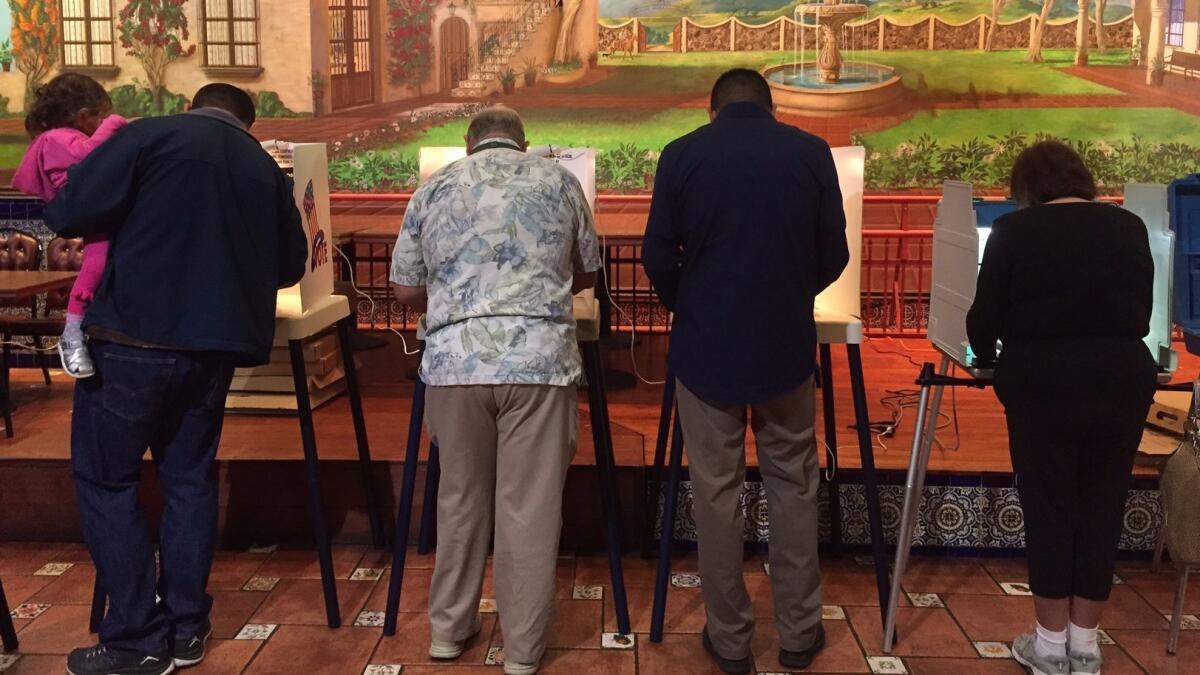There were serious problems in 2016 for some California voters who don’t speak English, new report says

Sacramento — California voters with limited English language skills were too often left on their own when it came to getting help casting ballots last November, concludes a sweeping new survey based on eyewitness accounts logged by hundreds of election volunteers.
The data raise significant questions about the effectiveness of a long-standing state election law designed to help those voters, and whether they will struggle more as counties are allowed to transition away from traditional neighborhood polling places.
“We’re talking about huge chunks of the electorate that are in danger of being disenfranchised,” said Jonathan Stein, a staff attorney with Asian Americans Advancing Justice-California.
The report comes as state lawmakers consider a bill to strengthen the rights of voters in communities whose primary language isn’t English. That proposal, Assembly Bill 918, faces a key legislative deadline in Sacramento later this month.
Language assistance during an election is covered by both federal and state law. In 1975, the federal Voting Rights Act was expanded beyond its historical focus on African American communities to require that “all election material that is available in English” also be provided “in the language of the applicable minority group.” Census data on voting-age adults are used to determine which counties must comply.
California’s own state law for non-English election materials, drafted in the early 1980s, applies to smaller communities and thus would seem to offer an additional layer of help. But it’s also less far-reaching than the federal rule, requiring only that a polling place provide a single sample ballot in the community’s predominant language.
State election law says that officials are required to display such a “facsimile ballot” in a “conspicuous location.” But the survey by the Asian American advocacy group found that on average, 1 in 4 polling places covered by the state law failed to provide the display copy of a non-English ballot. And it was missing from as many as 40% of the poll locations visited in larger counties.
“There’s clearly just a disconnect someplace,” said Deanna Kitamura, voting rights director for the Los Angeles office of Asian Americans Advancing Justice.
In a few locations, election materials in the other languages were easily findable. But in others, the report said, poll workers had no idea what a “facsimile ballot” was, or left the non-English sample in a box or under a pile of other election material.
The survey comes from data collected on election day by 576 volunteers who fanned out across 25 California counties, home to communities of voters whose primary languages included Spanish, Chinese and Hindi. In addition to missing ballot samples, volunteers also found spotty use of bilingual poll workers in communities of color where the voting population is so small as to be covered only by the state election mandates, not the federal Voting Rights Act. There, election officials only have to make what the law calls “reasonable efforts” at finding bilingual poll workers.
“The counties don’t take that ‘reasonable effort’ requirement seriously,” Stein said.
Dean Logan, Los Angeles County’s registrar of voters and president of the state association of county election officers, said it can be difficult to find qualified poll workers in those smaller communities.
“You’re dealing with a smaller population of people in the community that have those language skills,” Logan said. “I think that registrars do take it seriously.”
The pending legislation in the state Assembly would require new training for poll workers on offering a sample ballot in languages other than English. It would also mandate a new report, to be issued by the state after every general election, on how many bilingual poll workers were hired to assist voters.
“Almost every indicator suggests the state of California is not doing enough,” said Assemblyman Rob Bonta (D-Oakland), the bill’s author.
And the state will need to do more, too, as counties begin to transition to a new voting system — one in which neighborhood polling places are replaced by absentee ballots and a limited number of community “vote centers” that offer a variety of election services. Signed into law last year, the change could be implemented by as many as 14 counties beginning in 2018, with the remainder being eligible to switch over in 2020. Bonta said his bill would require limited-English-speaking voters be given a sample ballot in their primary language if they request it, and be mailed information on the process in voter guides and other materials.
“We need to make sure that language is taken into consideration,” he said.
Stein said that few states have as many registered or eligible Latino or Asian American voters as California does, adding that his group’s survey should help provide a catalyst for change.
“We know that huge percentages of voters in those groups need help,” Stein said. “We should be leading the country on this.”
Follow @johnmyers on Twitter, sign up for our daily Essential Politics newsletter and listen to the weekly California Politics Podcast
ALSO:
Some say it’s time California had statewide rules for using provisional ballots
Fewer Californians will vote at polling places under a law signed by Gov. Brown
Updates on California politics and government news
More to Read
Get the L.A. Times Politics newsletter
Deeply reported insights into legislation, politics and policy from Sacramento, Washington and beyond. In your inbox three times per week.
You may occasionally receive promotional content from the Los Angeles Times.











